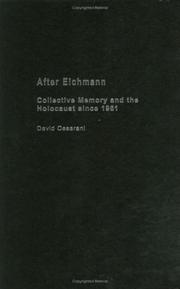| Listing 1 - 3 of 3 |
Sort by
|
Book
ISBN: 9791021007949 9791021002210 Year: 2014 Publisher: Paris : Tallandier,
Abstract | Keywords | Export | Availability | Bookmark
 Loading...
Loading...Choose an application
- Reference Manager
- EndNote
- RefWorks (Direct export to RefWorks)
Adolf Eichmann, haut fonctionnaire nazi, est l'incarnation de la « banalité du mal ». De 1941 à 1945, assis à son bureau, il organise méticuleusement l'extermination de millions de juifs. Après la guerre, Eichmann fuit en Argentine, où il mène une vie paisible. En mai 1960, enlevé par le Mossad, il est conduit en Israël pour y être jugé. Événement majeur, son procès s'ouvre à Jérusalem le 11 avril 1961 et est retransmis dans le monde entier. Un an plus tard, il est condamné à mort et pendu. Dans cette biographie magistrale, David Cesarani décrit comment Eichmann devient progressivement l'expert en questions juives et le complice de l'assassinat de millions de personnes. À partir de documents inédits, il répond à une question : comment un homme ordinaire se transforme en meurtrier de masse ?

ISBN: 9780415759090 9780415360159 0415360153 Year: 2014 Publisher: London Routledge
Abstract | Keywords | Export | Availability | Bookmark
 Loading...
Loading...Choose an application
- Reference Manager
- EndNote
- RefWorks (Direct export to RefWorks)
Book
ISBN: 022612004X 9780226120041 9781306577496 1306577497 9780226119984 022611998X Year: 2014 Publisher: Chicago London
Abstract | Keywords | Export | Availability | Bookmark
 Loading...
Loading...Choose an application
- Reference Manager
- EndNote
- RefWorks (Direct export to RefWorks)
What is the relationship between anger and justice, especially when so much of our moral education has taught us to value the impartial spectator, the cold distance of reason? In Sing the Rage, Sonali Chakravarti wrestles with this question through a careful look at the emotionally charged South African Truth and Reconciliation Commission, which from 1996 to 1998 saw, day after day, individuals taking the stand to speak-to cry, scream, and wail-about the atrocities of apartheid. Uncomfortable and surprising, these public emotional displays, she argues, proved to be of immense value, vital to the success of transitional justice and future political possibilities. Chakravarti takes up the issue from Adam Smith and Hannah Arendt, who famously understood both the dangers of anger in politics and the costs of its exclusion. Building on their perspectives, she argues that the expression and reception of anger reveal truths otherwise unavailable to us about the emerging political order, the obstacles to full civic participation, and indeed the limits-the frontiers-of political life altogether. Most important, anger and the development of skills needed to truly listen to it foster trust among citizens and recognition of shared dignity and worth. An urgent work of political philosophy in an era of continued revolution, Sing the Rage offers a clear understanding of one of our most volatile-and important-political responses.
Anger --- Justice (Philosophy) --- Nuremberg War Crime Trials, Nuremberg, Germany, 1946-1949. --- Nuremberg War Crime Trials, 1946-1949 --- Subsequent proceedings, Nuremberg War Crime Trials --- War crime trials --- Philosophy --- Indignation --- Madness --- Wrath --- Rage --- Emotions --- Temper --- Moral and ethical aspects. --- Philosophy. --- Arendt, Hannah, --- Blücher, Hannah Arendt, --- Bluecher, Hannah Arendt, --- Ārento, Hanna, --- Arendt, H. --- Arendt, Khanna, --- ארנדט, חנה --- アーレント, ハンナ, --- South Africa. --- Commission for Truth and Reconciliation (South Africa) --- South African Truth Commission --- TRC --- Truth and Reconciliation Commission (South Africa) --- anger, violence, rage, emotions, masculinity, justice, vengeance, revenge, retaliation, legal system, south african truth and reconciliation commission, protest, revolution, rebellion, activism, trauma, government, authoritarian state, dictator, discrimination, prejudice, politics, nonfiction, morality, apartheid, civil rights, mandela, race, affect theory, adam smith, hannah arendt, civic participation, community, nation, political philosophy, nuremberg war crime trials, eichmann adolf, trial, litigation, testimony, sympathy.
| Listing 1 - 3 of 3 |
Sort by
|

 Search
Search Feedback
Feedback About UniCat
About UniCat  Help
Help News
News